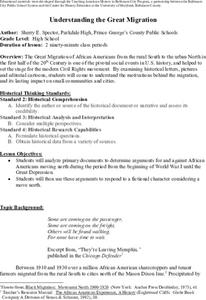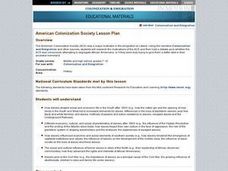Smithsonian Institution
Separate is Not Equal: Fight for Desegregation
Separate is not equal! An eye-opening lesson delves into the past to understand the fight for desegregation and how it impacted African American communities. Academics complete two one-hour lessons using documents, photographs, and...
Facing History and Ourselves
After Charlottesville: Public Memory and the Contested Meaning of Monuments
Are Civil War monuments a kind remembrance or a reminder of a dark past? The lesson focuses on the public's memory of the Civil War and the monuments that represent it. Young academics explore past efforts to change historical symbols...
Albert Shanker Institute
Strategizing for Freedom
Booker T. Washington, W.E.B. DuBois, Marcus Garvey, and A. Philip Randolph developed different views on how to advance civil rights for African Americans. Class members research these famous figures and their strategies before developing...
Teaching Tolerance
Jim Crow as a Form of Racialized Social Control
Just because slavery was illegal doesn't mean it went away ... Jim Crow Laws took its place. An eye-opening lesson focuses on how Jim Crow Laws were used as a form of racial social control against African Americans in the United States....
Teaching Tolerance
The War on Drugs—Mechanisms and Effects
The war on drugs doesn't have definite results. An interesting lesson plan examines the social, political, and economic effect of the war on drugs. Academics learn how the war on drugs has led to mass incarcerations and negatively...
Teaching Tolerance
Racial Disparity in the Criminal Justice System
Explore the impact of the war on drugs in a thought-provoking lesson plan for high school academics. Young historians delve into the world of the criminal justice system and the racial disparity that occurs in the US. The resource...
Teaching Tolerance
Parallels Between Mass Incarceration and Jim Crow
Is history repeating itself? A riveting lesson examines the parallels between mass incarceration in the U.S. and the Jim Crow Laws of the past. Academics review Jim Crow Laws and compare them to mass incarcerations of African Americans....
Center for History Education
Understanding the Great Migration
What would make someone leave home and travel thousands of miles to find another one? Young historians look at letters, demographic data, and artwork to answer the question for the Great Migration, or the movement of thousands of African...
American Institute of Physics
When Computers Wore Skirts: Katherine Johnson, Christine Darden, and the “West Computers”
Did you know that people, known as computers, performed the complex calculations that are now done by electronic computers? Three of these human computers, Katherine Johnson, Christine Darden, and Melba Roy Mouton are featured in a...
US House of Representatives
Objects in Time
Artifacts can be used to study people and events of the past. That's the takeaway from the fifth lesson plan in a unit study of African Americans who served in Congress. Groups select an artifact associated with a Black Congress Member...
Stanford University
Chicago Race Riots of 1919
Students explore the Chicago Race Riots of 1919. In this American history lesson, students watch the move "Up South" regarding the African American migration following World War I. Students read primary documents regarding the race riots...
PBS
Jackie Robinson's Complicated — and Important — Legacy
Americans tend to lock their heroes in history, holding these icons to a particular event or time. Jackie Robinson is such a hero, remembered by most for becoming the first African American to play in the Major Leagues. Young historians...
Curated OER
Africans and African Americans
Students complete small group tasks related to racism as it applies to African Americans, African immigrants, and white immigrants. Through discussion of their findings, students explain of challenges in society that African immigrants...
Library of Congress
To Kill A Mockingbird: A Historical Perspective
Students study the novel, To Kill a Mockingbird. Through studying primary source materials from American Memory and other online resources, students of all backgrounds study the relationships between blacks and whites.
Curated OER
Women's Achievements
Third graders read the passage in their textbook about Mary McLeod Bethune and discuss why education was important to her, and why she beleived that education allowed African American children to reach their potential. They then discuss...
Curated OER
Racism, Discrimination, and the Law
Seventh graders examine the various racism and discrimination faced by various ethnic groups in the United States. In groups, they research the legal system and describe the purpose of the United States Constitution. They review cases...
Curated OER
Matthew Henson: Heroic Explore Who Conquered Racism
Students explore the concept of racism. For this character building lesson, students read a biography about a hero Matthew Henson. Students discover the challenges he, and others, faced during a time of unfairness.
Curated OER
Questions to “Drawing the Color Line”
In this African American history activity, students watch "Drawing the Color Line" and then respond to 6 short answer questions about slavery.
Library of Virginia
Antebellum Freedom
From indentured servitude to involuntary race-based servitude, slavery has taken many forms in American history. Class members examine three manumission petitions that reveal how the rights of African Americans and African American...
Curated OER
African Americans in World War I - Lesson Two
Learners explore the decision to allow African Americans enlist in the military. In teams of three to four, students debate allowing Muslim Americans to enlist in the war. Learners not participating in the debate serve as legislatures....
Curated OER
Rosa Parks
Facts and transcripts of Rosa Parks are transcribed in this 9-slide PowerPoint. The slides include a brief biography, history of racism, which lead into Rosa Parks' refusal to give up her seat. What follows are slides about her feelings...
Smithsonian Institution
Native Resistance: Native Resistance Then and Now
Native Americans lost so much—and gained so little in return. Scholars explore Native Americans' resistance to the United States government. The lesson plan uses primary sources to explore the different forms of protest and gives a voice...
Curated OER
American Colonization Society
Students read and discuss a narrative on why African Americans supported emigration to the United States. In groups, they research the motivations of the ACS and hold a debate on whether the ACS promoted segregation or if they worked to...
C3 Teachers
Uncle Tom’s Cabin: Can Words Lead to War?
"Words, words, words." Despite Hamlet's opinion, words can be significant. In this inquiry lesson, middle schoolers learn how the words in Harriet Beecher Stowe's Uncle Tom's Cabin, in the view of many, lead to the American Civil War. To...

























